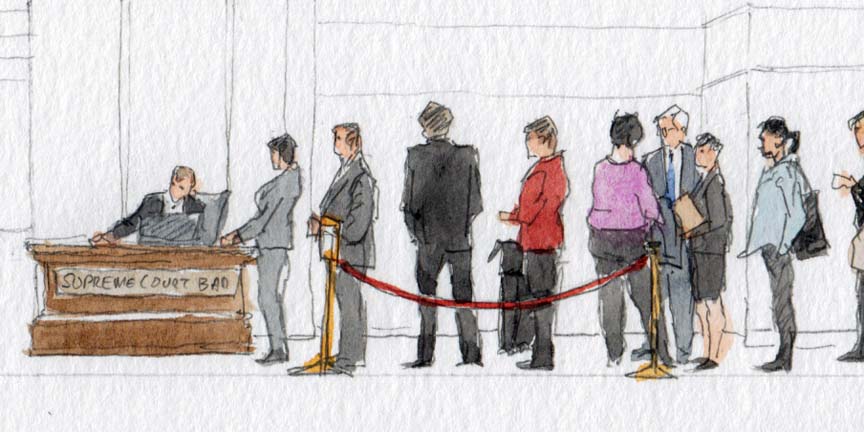Wednesday round-up

Today is a three-argument day at the Supreme Court. First up is Kansas v. Garcia, which asks whether federal immigration law preempts a state prosecution for identity theft based on using someone else’s Social Security number to obtain employment. Pratheepan Gulasekaram previewed the case for this blog. Lachanda Reid and Gabriela Markolovic have a preview at Cornell Law School’s Legal Information Institute. This morning’s second argument is in Rotkiske v. Klemm, which asks whether the one-year statute of limitations in the Fair Debt Collection Practices Act is paused until the plaintiff discovers the basis for his lawsuit. This blog’s preview came from Danielle D’Onfro. Emma Horne and Nicole Jaeckel have a preview for Cornell.
The justices will return to the bench after lunch to hear argument in Mathena v. Malvo, in which convicted D.C.-area sniper Lee Boyd Malvo is asking the court to overturn his sentence of life without parole. Amy Howe had this blog‘s preview, which first appeared at Howe on the Court. Allison Franz and Grant Shillington preview the case for Cornell. For The Washington Post (subscription required), Tom Jackman reports that the case is “the latest chapter in the high court’s evolving reconsideration of how to handle juveniles in the criminal justice system.” Additional coverage comes from Kevin Daley at the Daily Caller. At the Brennan Center, Andrew Cohen writes that Malvo is “unlikely to ever leave prison since he’s sitting on 10 life sentences[, b]ut his case and cause mean the world to about a dozen other juvenile offenders in Virginia now serving mandatory life sentences without parole.”
Yesterday, the justices heard argument in Financial Oversight Board for Puerto Rico v. Aurelius Investment, LLC, which asks whether the members of Puerto Rico’s Financial Oversight and Management Board were appointed in violation of the Constitution’s appointments clause. Amy Howe analyzes the argument for this blog, in a post that first appeared at Howe on the Court. Greg Stohr reports at Bloomberg that the “justices suggested reluctance to throw out the work of the oversight board responsible for pulling Puerto Rico out of its record bankruptcy.” Jess Bravin and Andrew Scurria report for The Wall Street Journal (subscription required) that “[t]he arguments largely revolved around whether the board’s functions were akin to those of a state or local agency rather than a federal one.”
Yesterday the court also released orders from last Friday’s conference. The justices did not add any cases to their merits docket, and they asked for the views of the solicitor general in one case. Amy Howe covers the order list for this blog, in a post that first appeared at Howe on the Court.
In an op-ed at The Hill, John Bursch argues that R.G. & G.R. Harris Funeral Homes Inc. v. Equal Employment Opportunity Commission, in which the court will decide whether federal employment discrimination law bars discrimination against transgender people based either on their status as transgender or on sex stereotyping, is “not about ‘transgender equality'[; i]t’s about whether businesses and everyday Americans have the right to rely on the law the way it is written.” At Understanding the ADA, William Goren unpacks the oral arguments in Harris and Bostock v. Clayton County, Georgia, in which the court will decide whether the same statute covers discrimination based on sexual orientation.
Briefly:
- At CNBC, Tucker Higgins reports that in County of Maui, Hawaii v. Hawaii Wildlife Fund, which asks whether the Clean Water Act covers pollution that moves through groundwater before reaching a federal waterway, “60 breweries concerned that the case could harm their water supply” have signed on to an amicus brief supporting the environmental groups. [Disclosure: Goldstein & Russell, P.C., whose attorneys contribute to this blog in various capacities, is counsel on an amicus brief in support of the respondents in this case.]
- At SCOTUS OA, Tonja Jacobi and Matthew Sag analyze last week’s oral argument in Kahler v. Kansas, in which the justices will decide whether the Constitution requires states to make the insanity defense available, assessing “the likely votes of each of the justices, based on everything they said at the oral argument, as well as what they have said in every other case they have heard in their time on the Bench.”
- At Truthdig, Bill Blum looks at “the potential blockbusters in waiting” at the Supreme Court this term.
- At Northwestern University Law Review, Meredith McBride weighs in on Espinoza v. Montana Department of Revenue, which asks whether Montana’s invalidation of a law that created tax credits to provide scholarships for families who send their children to private schools, including religious schools, was constitutional, arguing that the “social-emotional learning” taught in many public schools today “is moralizing and constitutionally problematic, but it doesn’t justify requiring states to fund religious schooling[, and i]t is not apposite to the issues the Court must decide in Espinoza.”
We rely on our readers to send us links for our round-up. If you have or know of a recent (published in the last two or three days) article, post, podcast or op-ed relating to the Supreme Court that you’d like us to consider for inclusion in the round-up, please send it to roundup [at] scotusblog.com. Thank you!
Posted in Round-up
